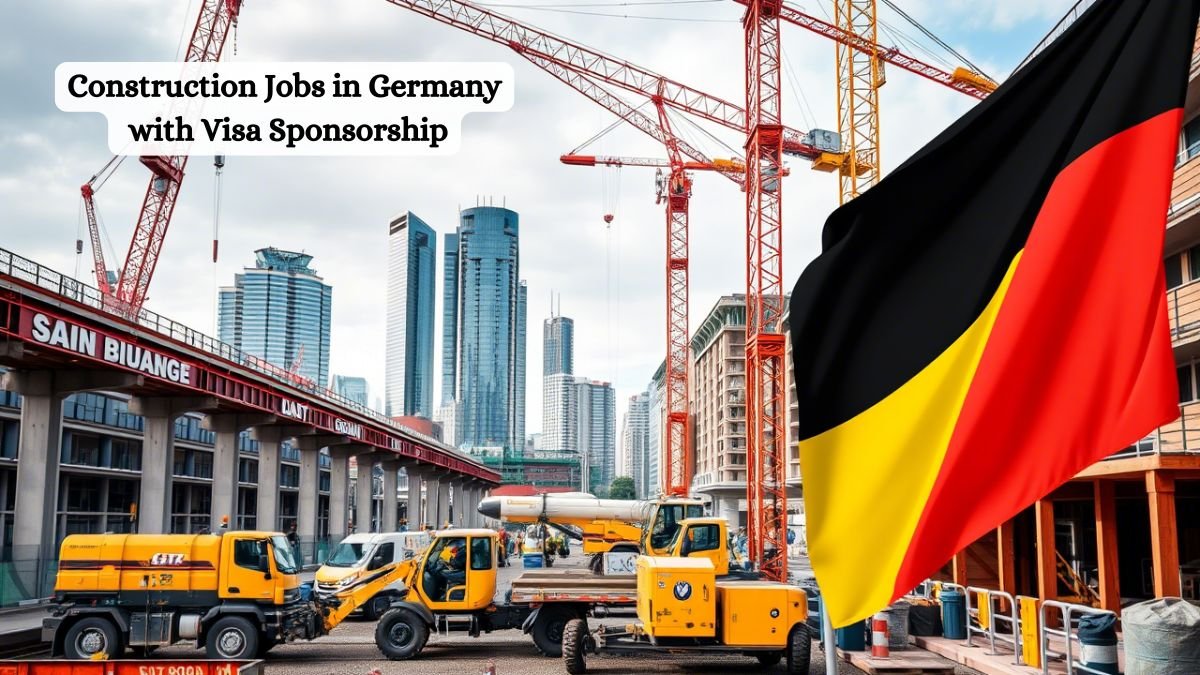Construction Jobs in Germany with Visa Sponsorship

Germany’s construction sector is experiencing a surge in growth. With cities growing, outdated structures being renovated, and numerous new infrastructure initiatives launching annually, the demand for labor is high.
However, Germany faces a shortage of workers to meet this demand. This is where you could play a part! If you’re a talented construction professional seeking employment overseas, Germany is eager to have you, and many firms are even willing to cover your visa costs.
Why Germany Needs Construction Workers
The Housing Crisis
Germany needs to build 400,000 new homes every year to meet demand. But right now, they’re falling short. Cities like Berlin, Munich, and Frankfurt are growing fast, and construction companies are struggling to find enough workers to keep up.
Big Infrastructure Projects
Germany is investing billions in:
- Renewable energy systems (like wind farms).
- High-speed rail networks.
- Modernizing bridges and roads.
These projects require skilled laborers, engineers, and project managers.
Aging Workforce
Many German construction workers are retiring. Younger Germans often prefer office jobs, leaving a gap that foreign workers can fill.
Types of Construction Jobs in Germany
Here are the most in-demand roles in Germany’s construction sector:
1. Construction Site Managers
They oversee projects, manage teams, and ensure deadlines are met.
2. Civil Engineers
They design and supervise infrastructure projects like roads and bridges.
3. Skilled Tradespeople
- Carpenters
- Electricians
- Plumbers
- Welders
4. Machine Operators
Workers who handle heavy machinery (excavators, cranes, etc.).
5. General Laborers
Workers for tasks like digging, lifting materials, and site cleanup.
Also Apply for: Construction Labourer Jobs in Canada With Visa Sponsorship ($35 Per Hour)
Construction Jobs in Germany: Roles and Salaries
| Job Role | Responsibilities | Average Monthly Salary (EUR) |
|---|---|---|
| Construction Manager | Plan projects, manage budgets, supervise teams | €4,500 – €6,500 |
| Civil Engineer | Design structures, ensure safety standards | €3,800 – €5,200 |
| Electrician | Install and repair electrical systems | €2,800 – €3,800 |
| Welder | Join metal parts for structures | €2,600 – €3,500 |
| Machine Operator | Operate heavy machinery (cranes, excavators) | €2,500 – €3,400 |
| General Laborer | Assist with manual tasks on-site | €1,800 – €2,500 |
Salaries vary based on experience, location, and company size.
How to Get a Construction Job in Germany with Visa Sponsorship
Step 1: Check Your Qualifications
Most jobs require:
- Relevant experience (2+ years).
- Certifications (e.g., welding licenses, engineering degrees).
- Basic German language skills (A1/A2 level is often enough).
Step 2: Find Companies Offering Visa Sponsorship
Search job portals like:
- Make it in Germany (official government site).
- Indeed Germany.
- StepStone.
Use keywords like “Baujobs mit Visum” (construction jobs with visa) or “Arbeitsvisum Baugewerbe”.
Step 3: Apply for the Job
- Tailor your resume to German standards (add a photo and keep it 1–2 pages).
- Write a short cover letter in simple German or English.
- Highlight certifications and hands-on experience.
Step 4: Apply for a Visa
Once hired, your employer will help you apply for a:
- EU Blue Card (for university graduates).
- Skilled Worker Visa (for vocational training graduates).
- Job Seeker Visa (if you need time to find work in Germany).
Benefits of Working in Germany’s Construction Sector
1. Competitive Salaries
German construction salaries are 20–50% higher than in many EU countries.
2. Strong Labor Laws
- Maximum 48-hour workweeks.
- 20+ paid vacation days yearly.
- Health insurance covered by employers.
3. Career Growth
Many companies offer training programs to help you specialize (e.g., green construction techniques).
4. Pathway to Permanent Residency
After 4–5 years of working in Germany, you can apply for a permanent residence permit.
Future in Germany?
The construction industry in Germany provides stable employment, competitive salaries, and opportunities for career advancement. With visa sponsorship options readily available, your goal of working internationally is well within reach. Take the first step by refreshing your resume, picking up some basic German expressions, and submitting job applications right away.


